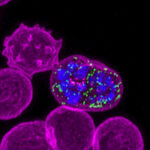Proteins are intricate molecules that are crucial for processes that make cells function. Proteomics studies the proteins produced by cells, called the proteome.
The proteomes of cells can vary:
- Within the same cell over time, such as in response to a stimulus.
- Between different types of cells, such as a neuron versus a red blood cell.
Differences between how cells function occur because of the variations in their proteomes. These differences can be seen in:
- The different types of proteins present.
- The amounts of each protein.
- Small chemical changes to proteins, such as phosphorylation (addition of a phosphate group).
- How proteins change their interactions with each other (signalling)
These differences can be linked to changes that occur in cells to cause disease, or in response to a disease.
Studying proteomes can provide insights into cell behaviour that may not be reached by looking at a few individual proteins. Proteomics also allows researchers to discover previously unknown changes in individual proteins that may not have been considered in studies of single proteins.
Proteomics also complements genomics research, as changes in a cell’s genetic material do not always reflect changes within the proteome.







